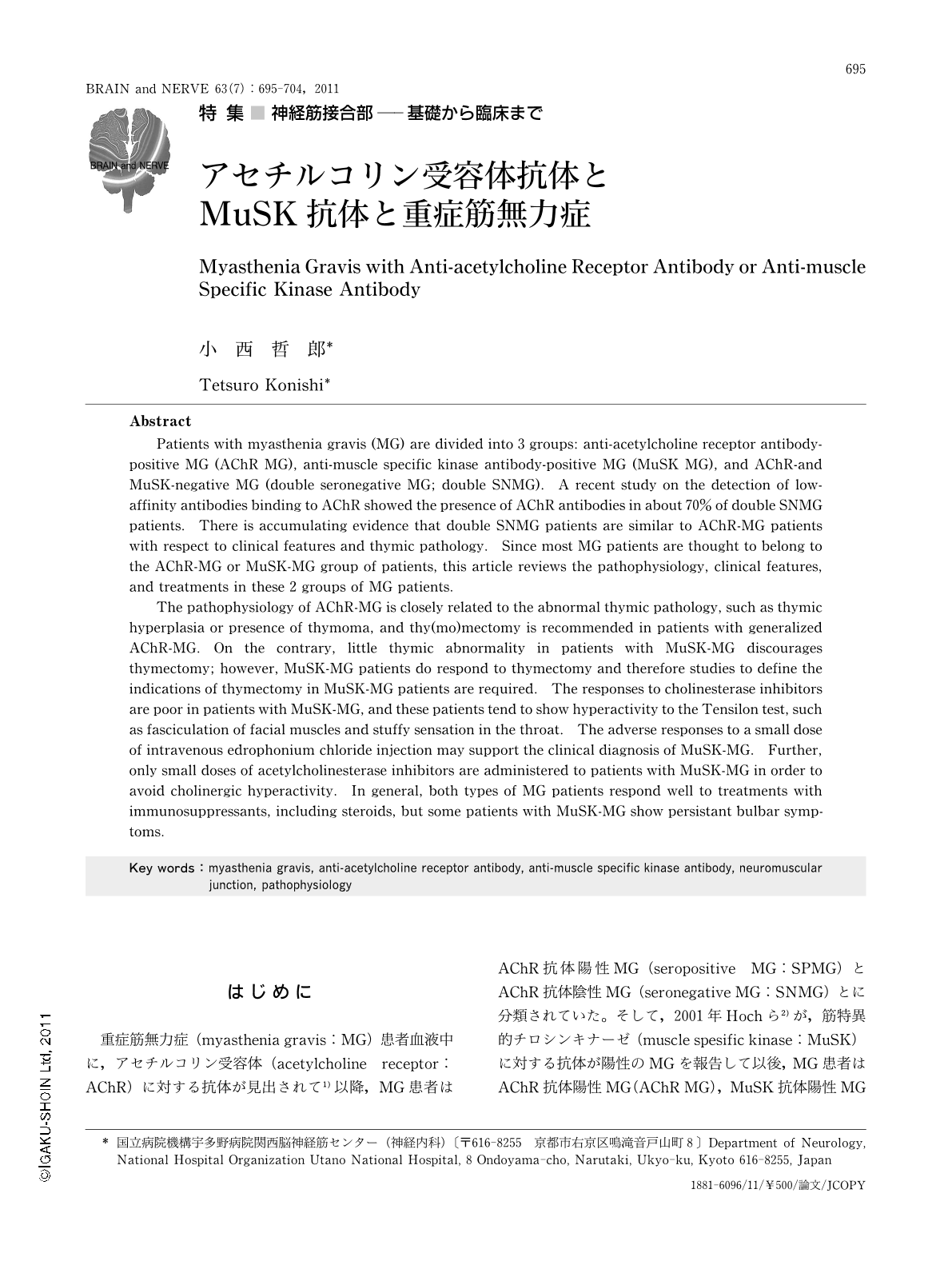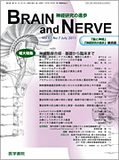Japanese
English
- 有料閲覧
- Abstract 文献概要
- 1ページ目 Look Inside
- 参考文献 Reference
はじめに
重症筋無力症(myasthenia gravis:MG)患者血液中に,アセチルコリン受容体(acetylcholine receptor:AChR)に対する抗体が見出されて1)以降,MG患者はAChR抗体陽性MG(seropositive MG:SPMG)とAChR抗体陰性MG(seronegative MG:SNMG)とに分類されていた。そして,2001年Hochら2)が,筋特異的チロシンキナーゼ(muscle spesific kinase:MuSK)に対する抗体が陽性のMGを報告して以後,MG患者はAChR抗体陽性MG(AChR MG),MuSK抗体陽性MG(MuSK MG),両抗体陰性MG(double SNMG)の3群に分類されている。両抗体陰性MGの臨床症状は通常のAChR MGに類似しており,胸腺異常を伴うことが多く,AChRに対する抗体が現在行われている抗体測定の検出レベル以下,あるいは存在する抗体のAChRに対するaffinityが低いために,AChR抗体が検出できないことなどが考えられてきた。事実,近年高感度AChR抗体検出法により,SNMGの7割がaffinityの低い抗体を持つことが明らかにされた3)。現時点では,ほとんどのMGはAChRに対する抗体を持つAChR MGかMuSKに対する抗体を持つMuSK MGに分類され,アグリン受容体であるlow density lipoprotein receptor related protein 4(Lrp4)に対する抗体を持つMGが最近見出されたが,その頻度は低いと考えられている。すなわち,MGの病態生理や治療を考えるうえで,AChR MGとMuSK MGを十分に理解すれば多くのMGを網羅すると思われる。
AChR MGは,AChR抗原が存在する胸腺が抗体産生の場で,神経筋接合部のシナプス後膜に存在するAChRがその抗体の標的となるという比較的単純なストーリーが描ける。ところが,MuSK MGは胸腺との関連が薄く,抗体産生の機序がまったく不明である。抗体の標的であるMuSK蛋白が,神経筋接合部の分化維持にかかわる多様な機能をつかさどることから,MuSK MGの病態生理は複雑で,これまでの動物モデルや患者生検神経筋の電気生理学的検査や神経筋接合部の形態の検討結果から,神経終末とシナプス後膜の両方のみならず,神経筋接合部にあるアセチルコリンエステラーゼ(acetylcholinesterase:AChE)の機能異常にも深く関わることが示唆されている。本稿では,AChR MGとMuSK MGの臨床および病態生理の違いに着目しつつ,それぞれの治療法の違いについても両疾患を対比して概説する。
Abstract
Patients with myasthenia gravis (MG) are divided into 3 groups: anti-acetylcholine receptor antibody-positive MG (AChR MG), anti-muscle specific kinase antibody-positive MG (MuSK MG), and AChR-and MuSK-negative MG (double seronegative MG; double SNMG). A recent study on the detection of low-affinity antibodies binding to AChR showed the presence of AChR antibodies in about 70% of double SNMG patients. There is accumulating evidence that double SNMG patients are similar to AChR-MG patients with respect to clinical features and thymic pathology. Since most MG patients are thought to belong to the AChR-MG or MuSK-MG group of patients, this article reviews the pathophysiology, clinical features, and treatments in these 2 groups of MG patients.
The pathophysiology of AChR-MG is closely related to the abnormal thymic pathology,such as thymic hyperplasia or presence of thymoma,and thy(mo)mectomy is recommended in patients with generalized AChR-MG. On the contrary,little thymic abnormality in patients with MuSK-MG discourages thymectomy; however,MuSK-MG patients do respond to thymectomy and therefore studies to define the indications of thymectomy in MuSK-MG patients are required. The responses to cholinesterase inhibitors are poor in patients with MuSK-MG,and these patients tend to show hyperactivity to the Tensilon test,such as fasciculation of facial muscles and stuffy sensation in the throat. The adverse responses to a small dose of intravenous edrophonium chloride injection may support the clinical diagnosis of MuSK-MG. Further,only small doses of acetylcholinesterase inhibitors are administered to patients with MuSK-MG in order to avoid cholinergic hyperactivity. In general,both types of MG patients respond well to treatments with immunosuppressants,including steroids,but some patients with MuSK-MG show persistant bulbar symptoms.

Copyright © 2011, Igaku-Shoin Ltd. All rights reserved.


